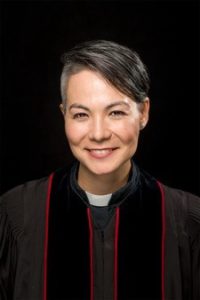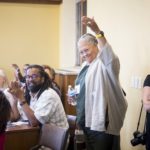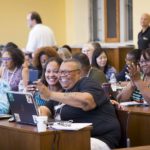The Elevator Speech
This post is part II of a series titled, “Why Vanderbilt Divinity” that provides different perspectives from the Vanderbilt Divinity School (VDS) community about why VDS makes a top school to consider for graduate theological education.
When I am out recruiting with a group of university-embedded divinity schools, I have a little speech I give to people. And here is how it starts: “You can get an excellent education at any of these schools.”
This is probably because my sociology major involved my primary work being on the sociology of education, and social stratification by race, class, and gender. I learned that standardized tests and IQ tests actually measure the test-taker’s race and class and ability to take standardized tests. (See this article on departments that have dropped the GRE as a requirement for applications)
An education is what you make it. I chose to go to a little-known denominational free-standing seminary in the Midwest for a lot of reasons, only one of which was because I knew my ego was already inflated, and going to some of my other options might make me insufferable.
Back to my elevator speech.
You can get a good education anywhere. What matters is that you are in a place that fits.
I do not mean a place that is comfortable. Theological education is inherently uncomfortable. No matter how prepared you are, theological education will always upend, deconstruct, and challenge. That’s the point. It is a degree of formation, not just an academic degree or a professional degree. It will feel like a jungle (diverse, teeming with life, gorgeous, and not always familiar). It will feel like a desert (beautiful, dry for those prone to wandering, with long stretches where you feel very exposed to the heat of the sun). It will feel like hiking through mountains (difficult to see what’s around the corner, occasionally slippery, but then you stumble onto an alpine meadow filled with flowers very different from the sea-level ones you’re accustomed to).
You will get to meet the most interesting people, some people who remind you of where you come from, and some who you have never been around before in your life. The catch is that you don’t meet and greet, and then never see them again. Wrong industry. You will be building community with these people for years. This is showing one another the raw places, talking about faith practices that seem foreign (some traditions speak in tongues, some practice infant baptism), bumping into assumptions faithfully built over generations of religious practice.
If you can manage studying a lot, being uncomfortable, learning exactly what you didn’t expect, feeling a lot of feelings, doing something you never imagined before (I have STORIES), being exposed to ways of thinking and talking about God/faith/ministry/the Bible you aren’t sure you will ever agree with, well, then theological education might be for you.
To read part I in the series, go here >>

Laura Mariko Cheifetz began serving as the Assistant Dean of Admissions, Vocation, and Stewardship in August 2019. She is an ordained minister in the Presbyterian Church (U.S.A.), a graduate of North Park University (MBA, ’11), McCormick Theological Seminary (M.Div. ’05), and Western Washington University (BA in Sociology, 2000).
She is a contributing editor to Inheritance, a magazine amplifying the stories of Asian American and Pacific Islander Christian faith. She is the co-author and editor of “Church on Purpose: Reinventing Discipleship, Community, & Justice” (Judson Press) and contributor to “Race in a Post Obama America: The Church Responds” (Westminster John Knox Press), “Leading Wisdom: Asian and Asian North American Women Leaders” (WJK), “Here I Am: Faith Stories of Korean American Clergywomen” (Judson), and “Streams Run Uphill: Conversations with Young Clergywomen of Color” (Judson). She is co-author of the “Forming Asian Leaders for North American Churches” entry in the “Religious Leadership” reference handbook (SAGE Publishing). An occasional contributor to various blogs, her piece “Race Gives Me Poetry” for “Unbound: An Interactive Journal of Christian Social Justice” won the Associated Church Press 2016 Award of Excellence — Reporting and Writing: Personal Experience/1st Person Account (long format).
Laura is multiracial Asian American of Japanese and white Jewish descent. She was the fourth generation of her family to be born in California, and grew up in eastern Oregon and western Washington. Laura has served on various boards, national and international ecumenical bodies, and has been president of two homeowners associations. She is currently the co-moderator of the Special Committee on Per Capita-Based Funding & National Church Financial Sustainability for the Presbyterian Church (USA). As you might imagine, she is well-versed in people and politics.
Laura and her partner, Jessica Vazquez Torres, the National Program Manager for Crossroads Antiracism Organizing & Training, live in Decatur, GA with two rescued Shih Tzus. They enjoy all their nieces and nephews, and hope to be such fabulous aunties that the kids smuggle good booze to them in their retirement home. In their free time, Jessica bakes and Laura delivers the baked goods to friends and neighbors.







